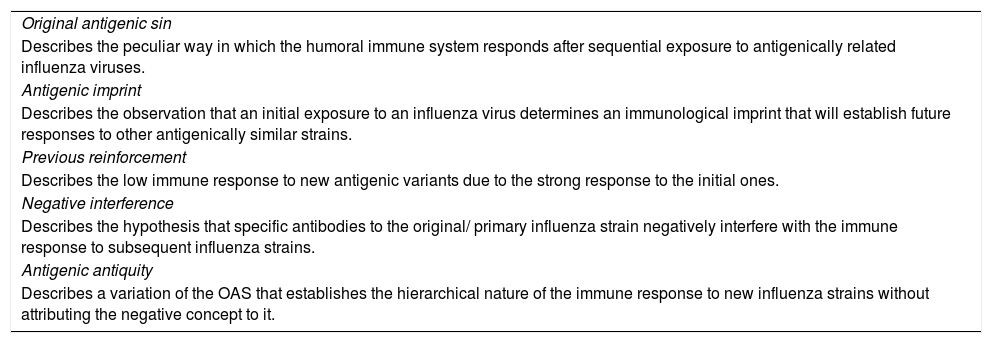In 1960 Thomas Francis, studying the response to revaccination against influenza, confirmed that those revaccinated had a lower antibody immune response than those who had not been previously vaccinated. This data reinforced his hypothesis according to which the first dominant influenza antigen is repeatedly stimulated throughout people's lives, despite the fact that it becomes secondary or less in later strains.
He gave this phenomenon the name of "original antigenic sin" (OAS). Antibodies originating in childhood are largely a response to the dominant antigen of the influenza virus that causes the first infection of life. The immunological footprint established by the original influenza virus infection will determine the antibody response from that moment on. This phenomenon, also called Hoskins paradox, negative interference or antigenic interaction, determines that in a new vaccination with antigenically different influenza strains of the same virus, the immune system responds basically with the antibodies already present, due to immunological laziness, and to a lesser extent with the new induced by the new vaccine, reducing the protective efficacy against this second.
For all this and despite the persistent connotation of "sin" as a negative attribute, it seems clear that the responses of the PAO will never be totally good or bad but will depend on the previous immune situation. But it does seem clear and proven that "the first flu is forever" as it will mark the way in which our immune system will respond to other flu strains throughout the rest of our lives.
En 1960 Thomas Francis, estudiando la respuesta a la revacunación frente a la gripe, confirmó que los revacunados presentaban una menor respuesta inmune de anticuerpos que los que no se habían vacunado previamente. Este dato reforzó su hipótesis según la cual el primer antígeno gripal dominante se estimula repetidamente a lo largo de la vida de las personas, a pesar de que éste se convierta en secundario o menor en las cepas posteriores.
A este fenómeno le dio el nombre de “pecado antigénico original” (original antigenic sin) (PAO). Los anticuerpos originados en la infancia son en gran medida una respuesta al antígeno dominante del virus gripal que causa la primera infección de la vida. La huella inmunológica establecida por la infección del virus gripal original determinará la respuesta de anticuerpos a partir de ese momento.
Este fenómeno, también denominado paradoja de Hoskins, interferencia negativa o interacción antigénica, determina que, en una nueva vacunación con cepas gripales antigénicamente distintas del mismo virus, el sistema inmune responde básicamente con los anticuerpos ya presentes, por pereza inmunológica y en menor medida con los nuevos inducidos por la nueva vacuna, disminuyendo la eficacia protectora frente a esta segunda. Por todo ello, y a pesar de la persistente connotación de “pecado” como un atributo negativo, parece evidente que las respuestas del PAO nunca serán totalmente buenas o malas, sino que dependerán de la situación inmune previa. Pero sí parece evidente y constatado que “la primera gripe es para siempre” (first flu s forever) ya que marcará la forma mediante la cual nuestro sistema inmune responderá a lo largo del resto de nuestra vida a otras cepas gripales.









